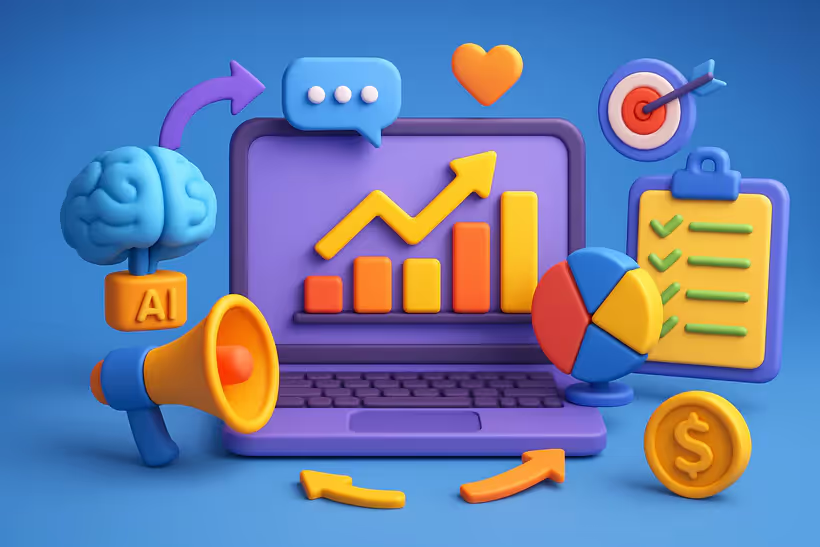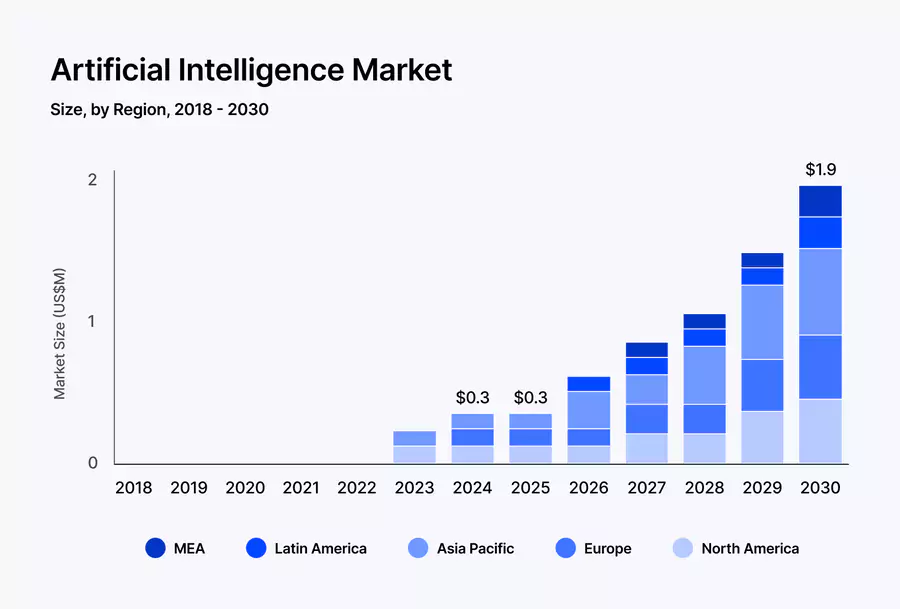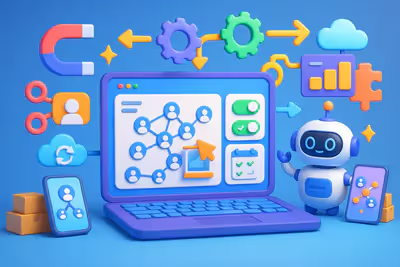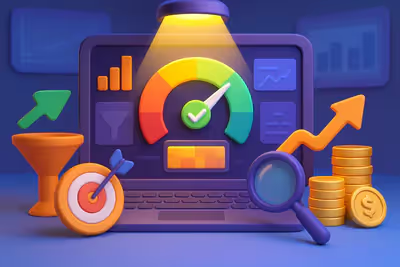13 Strategic Applications of AI in Digital Marketing
1. Intelligent Customer Relationship Management (CRM)

AI is transforming customer relationship management by predicting future behaviors with 85-90% accuracy. monday and HubSpot CRM use predictive algorithms to automatically score leads and optimize customer journeys.
| 📊 Metric | 📈 Typical 2026 Lift Range | ⏱️ Estimated Timeline | 🧪 AI Levers Used | 🎯 Secondary KPIs to Track | 🛡️ Notes & Success Conditions |
|---|---|---|---|---|---|
| 📈 Lead-conversion rate | +25–40 % (speed-to-lead & predictive nurturing) | 2–4 weeks (after automation deploy) | Instant routing & replies, predictive scoring, adaptive nurture sequences | SQL rate, first-response time, CAC, demo no-show rate | Needs SLA <5 min & clean data; gains plateau without ongoing A/B creative |
| ⏱️ Manual qualification time | -50 % (human workload reduction) | Immediate (0–7 days config) | Enriched forms, ML pre-scoring, firmographic API enrichment, filtering chatbots | SDR hours saved, cost per qualified opp, false-positive rejection rate | Monitor scoring drift; retrain models with sales feedback |
| 😊 Customer satisfaction (CSAT / NPS) | +20–30 % (median peak ~+25 % over 1–2 mo) | 1–2 months (stable after chatbot & KB iterations) | 24/7 NLP chatbots, dynamic FAQ, intent routing, offer personalization | First Contact Resolution, resolution time, agent escalation rate, retention | Train bot on real intents; watch for hallucinations & tone; seamless human hand-off |
💰 Budget : $50-500/month depending on the volume of contacts
🔧 Implementation complexity : Medium (2-4 weeks)
⚠️ Main risk : Over-dependence on historical data that can bias future predictions
2. Advanced Behavioral Segmentation
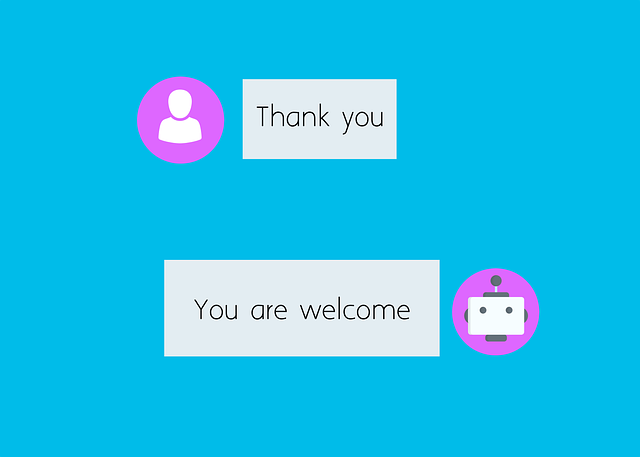
Deep learning algorithms analyze micro-behaviors to create highly accurate segments. HubSpot Marketing Automation and Klaviyo excel in this predictive approach.
🎪 Applications:
- 🎯 Real-time segmentation based on purchase intent
- 🎨 Dynamic content personalization by segment
- 💎 Customer Lifetime Value (CLV) Prediction
📊 Documented ROI : +35% in email marketing revenue, +20% in customer retention
💳 Budget : $200-2000/month according to the database
⏳ Set-up time : 4-8 weeks with team training
3. E-Commerce Intelligence and Recommendations

AI is revolutionizing the online shopping experience with personalized recommendations generating 10-30% of total revenue. AliDropship and Shopify Plus integrate these features natively.
This is where AI can help e-commerce platforms. or the software for creating websites by AI.
Now, e-commerce businesses can track and follow prospects more effectively on the internet thanks to these artificial intelligence technologies.
| ⚙️ Feature / Initiative | 📈 2026 Business Impact | ⏱️ Timeline / Cost to Deploy* | 🧪 AI & Data Levers | 🎯 KPI to Monitor | 🛡️ Watch-Outs |
|---|---|---|---|---|---|
| 🔄 Automated Cross-sell / Upsell (post-purchase & journey) | +12–20 % typical AOV lift (retail & contextual ML offers). Realistic median target: +15 %. | 1–2 weeks (deploy widgets + catalog data pipeline) | AI product recommendations (similarity, co-purchase), trigger offers at order confirmation | AOV, upsell take-rate, % revenue from add-ons, LTV | Offer fatigue, relevance drift; watch for product-return spikes |
| 💰 AI-Driven Dynamic Pricing | +5–12 % incremental gross margin (e-commerce & travel cases). Conservative target: +8–10 % phase 1 | 2–4 weeks (collect price/stock history + deploy rule/ML engine) | Multi-factor optimization (stock, elasticity, competitor, seasonality, weather) | Gross-margin %, stock turn, perceived-price index, volume vs forecast | Fairness perception, regulatory compliance, avoid over-volatility |
| 🛤️ Customer-Journey Orchestration | +15–25 % funnel conversion (friction removal; high-ROI CRO) & targeted budget reallocation | 3–6 weeks (mapping, analytics instrumentation, A/B experiments) | Behavioral segmentation, funnel-stage scoring, real-time triggers (email, push, onsite) | Funnel conversion rate, drop-off per step, task time, CSAT/NPS | Maintenance complexity, tracking debt, intrusive over-personalization |
💰 Investment : $500-5000/month depending on the volume of transactions
⚙️ Technical Consideration : Requires integration with existing systems (ERP, stock)
4. Conversational Chatbots and Customer Support

Les AI chatbots modern ones handle 70-80% of level 1 customer requests. HubSpot Chatbot and Intercom offer solutions with natural language processing (NLP).
📈 Performance metrics:
- ✅ Automatic resolution of 75% of standard requests
- ⚡ 60% reduction in average response time in order to offer a better experience
- 🌙 24/7 availability with no marginal cost on any website and language (English, French, etc...)
💸 Realistic budget : $100-800/month + configuration cost
🎓 Training required : 2-3 days for optimal settings
⚠️ Limitation : Effective for FAQs and standardized processes only
5. SEO and Smart Content Optimization

AI analyzes search algorithms to automatically optimize content. SEO tools like Google Search Console, Moz Pro, and Ahrefs incorporate AI-driven recommendations.
🔧 Operational applications:
- 🔮 Predictive keyword research based on trends
- 🏷️ Automatic optimization of meta tags and titles
- 🕵️ Real-time competitive analysis
📊 Measured gains : +40% organic traffic, +25% average positions
💰 Cost : $100-500/month for tools + $1000-3000 for initial audit
⏰ Timeline : Visible results in 3-6 months
6. AI Content Generation and Copywriting

Tools like Jasper and Grammarly automate 60-80% of marketing content production. Grammarly ensures editorial quality.
By analyzing the various data entered into the system, AI writing softwares allows you to create content that is more likely to convert prospects into customers.
| 🧪 Use case | ⚡ Productivity gain | ✅ Quality (rating) |
|---|---|---|
| 📢 Ad copy variations | 5× faster (automated generation & A/B testing) | ⭐⭐⭐⭐ (high brand consistency, light human review) |
| 📧 Personalized automated newsletters | 4× faster (dynamic templates + segmentation) | ⭐⭐⭐⭐⭐ (fine personalization & optimized open rates) |
| 🏷️ Bulk product descriptions | 8× faster (catalog batch generation) | ⭐⭐⭐ (requires SEO & tone QA) |
💳 Investment : $30-100/month per user
⚠️ Point of attention : Human validation essential to avoid factual errors
7. Webinar Automation and Lead Nurturing

Best webinar software platforms, such as Demio, EasyWebinar and Everwebinar, all use artificial intelligence to automate the process of organizing a webinar.
Demio, EasyWebinar, and EverWebinar automate the entire webinar process. AI optimizes participation rates and lead generation.
🎯 Automated features :
- 📩 Personalized invitation sequences and reminders
- 🎭 Simulated interaction in an automated webinar
- 📊 Scoring of participants according to commitment
📈 Performance : +50% show-up rate, +30% post-webinar conversion
💰 Budget : $200-1000/month depending on audience
⏱️ Implementation time : 2-4 weeks for complete process
8. Predictive and Personalized Email Marketing
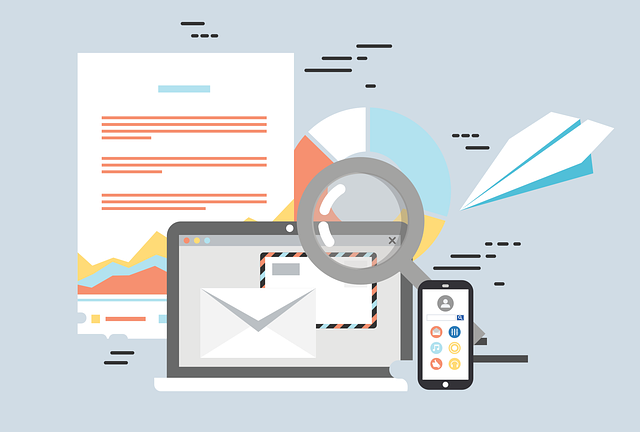
As with any other marketing channel, the main goals of email marketing software are to meet customer needs and increase conversions.
Tools like ActiveCampaign, Constant Contact, and GetResponse use AI to optimize timing, content and frequency of sending according to each contact.
🔄 Automatic optimizations :
- 🕐 Individual Send Time Optimization (STO)
- 💬 Automatic generation of efficient subject lines
- 🎯 Dynamic behavioral segmentation
| 📊 Metric | 📈 Benchmark Target | ⏱️ Estimated Timeline | 🧪 Main Levers | 🎯 Supplementary KPIs | 🛡️ Success Conditions / Risks |
|---|---|---|---|---|---|
| 📖 Open Rate | +25 % (e.g., 32 % → 40 %) | 2–4 weeks | Granular segmentation, personalized subject lines, deliverability hygiene (SPF/DKIM/DMARC), text-to-image ratio, A/B testing | Deliverability %, spam rate, unique opens, first-24 h engagement | List hygiene (remove inactives), avoid over-segmentation; watch for inbox-provider shifts |
| 👆 Overall CTR | +35–40 % (e.g., 3 % → 4.2 %) | 1–2 months | Single clear CTA, dynamic content, segment personalization, mobile optimization, action-oriented pre-header | Click-to-open (CTOR), email scroll depth, post-click conversions | Avoid link overload (dilution); ensure subject-line promise ↔ content match |
| 👋 Unsubscribe Rate | -20 % (e.g., 0.5 % → 0.4 %) | ≈1 month | Frequency preferences, behavioral targeting, hard-bounce cleanup, increased perceived value | Spam complaints, net list churn, re-activation rate | Transparent opt-in; offer “pause” instead of full opt-out |
💰 Cost : $50-300/month depending on the volume of shipments
📋 Prerequisites : Qualified database of at least 1000 contacts
9. Predictive Analytics and Business Intelligence

Google Analytics 4, Zoho Analytics, and IBM Watson Analytics transform data into actionable insights with 30-90 day predictions.
This is where big data tools and various AI software programs come into play.
🎯 Strategic capabilities :
- 💰 Revenue prediction by marketing channel
- ⚠️ Identification of segments at risk of churn
- 🔗 Automated multi-touch attribution
📈 Added value : +30% marketing budget efficiency, -25% advertising waste
💳 Investment : $200-2000/month depending on the complexity of the analyses
🎓 Expertise required : Data analyst or in-depth team training
10. Social Media Automation and Optimization

The tools tools of management and programming of social networks.like eClincher, Crowdfire and Rebrandly automate publishing while optimizing engagement through predictive audience analytics.
⚙️ Key features :
- 📅 Optimal planning based on audience activity
- #️: Automatic generation of relevant hashtags
- 🤝 Automated responses with Sentiment Analysis
📊 Measured impact : +45% commitment, -70% in management time
💰 Budget : $50-400/month depending on the number of accounts
🎯 Optimal ROI : From 5+ social accounts to manage
11. Programmatic Advertising and Ad Optimization

AI is revolutionizing the purchase of advertising space with automated auctions and real-time optimization. Google Ads Smart Bidding and Facebook Advantage+ automate 90% of advertising decisions.
Tools like AdCreative AI allow you to create AI-optimized ads in just a few clicks.
| 📊 Platform | 🤖 AI / Automation Feature | 🚀 Performance Gain | 🔍 How It Improves | 🎯 KPIs to Watch |
|---|---|---|---|---|
| 🌐 Google Ads | Smart Bidding (tCPA / tROAS + Exploration) | +15–20 % conversions (median), up to +19 % observed | Real-time bid adjustments (device, time, query signals) plus query expansion for high-intent traffic. | Conversions, CPA / CAC, incremental ROAS, new-query rate |
| 📘 Meta Ads | Advantage+ (Shopping / Creative / Audience) | +25–32 % ROAS potential (multi-account tests) | Auto-combines creatives & targeting, expands high-performing audiences via dynamic creative optimization. | ROAS, CPA, lift tests, frequency, creative-test cost |
| 📺 YouTube | Video Action / Demand Gen Performance | +30–35 % qualified views / video conversions | Serves ads to users most likely to act (site visit / lead) using intent signals and action-focused formats. | Qualified views, post-view CVR, CPV, cost per video conversion |
🚀 Key benefits :
- 🎯 Predictive behavioral targeting
- 💰 Automatic bid optimization
- 🔄 Automated creative A/B testing
💳 Minimum budget : $1000/month of advertising expenses
⏰ Results : Visible optimization as early as 2-3 weeks
⚠️ Risk : Loss of granular control over bids
12. Real-Time Web Customization

Optimizely, VWO and Dynamic Yield personalize the web experience according to the visitor profile in real time. AI analyzes 100+ signals to adapt content, offers, and journeys.
🔧 Automatic customizations :
- 🏠 Home page adapted to the visitor profile
- 💝 Dynamic offers based on history
- 🛒 Contextual product recommendations
| 🏭 Sector | 🚀 Realistic 2026 Conversion Lift Range | 💲 Investment Level / Type | 🧪 Core AI Levers | 🎯 Secondary KPIs to Monitor | ⚠️ Key Watch-Outs |
|---|---|---|---|---|---|
| 🛍️ E-commerce | +25–40 % via personalization & contextual recommendations | Premium (personalization stack + continuous testing) | Product recommendations, dynamic bundling, cart-abandon recovery, agentic CRO | AOV, add-to-cart rate, churn, repeat purchase | Data-quality dependency, promo fatigue, privacy (consent) issues |
| 🏦 Finance (Bank / Insurance / FinTech) | +15–25 % via risk segmentation & next-best-offer | Enterprise (CRM integration + compliance) | Predictive scoring, offer personalization, compliance assistants | Activation rate, CLV, default rate, acquisition cost | Strict regulation, model explainability, credit-bias risk |
| 🎓 Education / EdTech | +30–50 % via adaptive learning paths & nurturing | Standard (LMS platform + AI engine) | Content matching, module recommendations, tutor chatbots, engagement scoring | Completion rate, time-on-module, learner NPS | Source-content quality, pedagogical drift, notification overload |
💰 Investment : $500-5000/month depending on traffic
🎯 Minimum ROI : Recommended for +50K visitors/month
13. Voice Marketing and Voice Search

With 50% of voice searches by 2026, optimizing for Alexa, Google Assistant, and Siri is becoming critical. Answer the Public and BrightEdge offer voice optimization solutions.
📱 Strategic applications:
- 🗣️ Content optimization for voice requests
- 🏪 Use of proximity marketing via voice assistants
- 🎵 Branded audio content and AI podcasts
📊 Market opportunity : 30% of local searches are voice
💡 Competitive advantage : Market still not very saturated
🎯 Priority sectors : Local business, e-commerce, services
🚀 Marketing AI is no longer a competitive advantage but a business necessity. The challenge is no longer whether to adopt it, but how to integrate it intelligently into your existing technology stack to maximize ROI from the first few months.
Challenges and limits of AI marketing
Ethical and privacy concerns

AI marketing raises major ethical and privacy concerns. 92% of consumers are concerned about the use of their personal data in automated campaigns. This distrust has a direct impact on the effectiveness of marketing strategies AI.
Personalized AI campaigns can see their engagement rate drop if consumers feel monitored or manipulated. Compliance with regulations like the GDPR further complicates the situation, with 75% of businesses struggling to comply while exploiting the potential of AI.
Initial implementation costs

Adopting AI marketing is a significant investment, especially for SMEs. An AI marketing project can cost between $1 million and $10 million (Deloitte, 2023), which is holding back many organizations.
Despite these high costs, the potential for profitability is promising:
- Average ROI estimated at 220% over three years (+ money = more profits)
- Spending on marketing AI systems expected to reach $154 billion
- 35% of businesses cite a lack of budget as the main obstacle
- Payback time generally estimated between 18 and 24 months
Need for specialized skills

The effective implementation of AI marketing requires advanced technical skills, creating a race for talent in the sector. The median salary for an AI marketer reaches $137,000 per year in the United States, reflecting the scarcity of these skills.
Risks of over-dependence on AI
Excessive dependence on AI marketing can have harmful consequences. 68% of consumers still prefer to interact with humans for complex marketing services.
The risks associated with over-automation are multiple and significant:
- Loss of control over the brand message
- Market panic over news and impacts on both companies and global stock markets
- Potential financial impact reaching 15% of turnover
- 72% of AI marketing projects do not reach their initial goals
- Decreased customer loyalty due to a lack of human personalization
Balance between AI and human creativity

Effective marketing is based on a synergy between AI and human creativity.
The top companies using a hybrid approach in their marketing see a 73% increase in the effectiveness of their campaigns.
This balanced approach makes it possible to harness the power of AI while maintaining the human touch that is essential for effective marketing.
Conclusion
AI marketing tools are in constant evolution, and it can be hard to keep up with all the changes.
With so many options available, choosing the right tool for your specific needs is critical.
As you can see, AI can be used in a variety of aspects of marketing, from content creation to social media management.
If you are looking to improve your marketing strategy, consider integrating AI into your marketing plan.
You might be surprised at the difference that can make.
Want to know even more AI use cases in this day and age?
Here is a list of the best AI investment software and applications on the market right now.
In addition, the AI recruitment softwares can help businesses make better hiring decisions in the workplace.
FAQS
Here are answers to the most common questions in the field of AI Marketing:
How is artificial intelligence transforming modern marketing strategy?
AI is revolutionizing predictive personalization (Amazon +29% sales), real-time optimization, multi-touch attribution, and intelligent automation in no time. HubSpot automatically scores 40% of qualified leads using AI. It does not replace human strategy but increases its impact on marketing performance tenfold.
What skills should you develop in AI marketing?
Master the basics of SQL for data analysis, machine learning principles, and interpreting predictive metrics. Recommended courses: Google Analytics Academy (free), HubSpot Content Marketing (certifying). Investment: 10-15h/month for 6 months for operational autonomy.
How to prepare for the regulatory evolution of AI?
The European AI Act 2026 imposes the transparency of high-risk AI systems and the right to the explanation of automated decisions. Document your AI processes, implement traceability, and train your legal teams. Budget 5-10% of your AI budget for regulatory compliance.
Which AI Marketing platform should you choose without crashing?
Try 30 to 60 days on a low budget. Check the security certificates (SOC 2, ISO 27001) and read the encrypted case studies. Avoid the promises of +500% and the tools that require total access to your customers' privacy.
What ROI do you really expect from an AI Marketing tool?
B2C: 2-4 months; B2B: 6-12 months. Average gain: +20% conversion, —35% acquisition cost. Budget 3-6 months before measuring a significant return.
Is Marketing AI replacing teams?
No It amplifies your words: Amazon gains +29% in sales through predictive personalization. Always keep human validation.
What are the real risks of AI Marketing?
Biases, hallucinations, GDPR fines up to 4% of turnover. Conduct a monthly audit, document your processes and transparent exchanges with legal authorities.
What AI marketing technology should you start with?
Customer Data Platform (Segment, mParticle) + automated email (Mailchimp AI). Budget: $2,000-15,000/month depending on the size.

.svg)
